Michail Kalntis
Meta-Learning-Based Handover Management in NextG O-RAN
Dec 26, 2025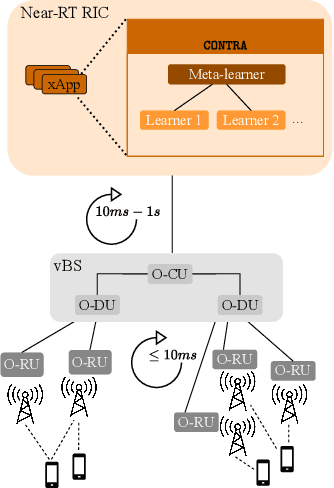
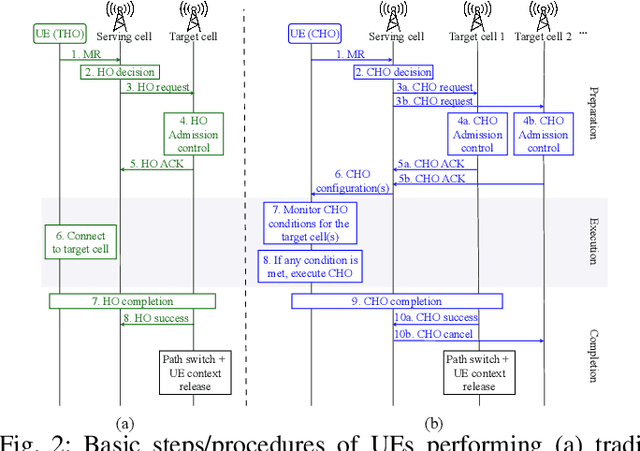
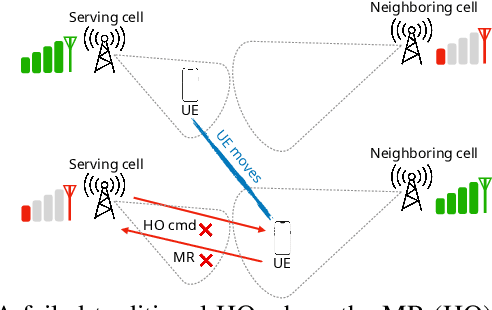
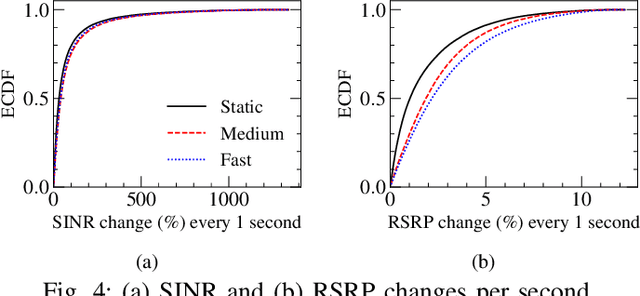
Abstract:While traditional handovers (THOs) have served as a backbone for mobile connectivity, they increasingly suffer from failures and delays, especially in dense deployments and high-frequency bands. To address these limitations, 3GPP introduced Conditional Handovers (CHOs) that enable proactive cell reservations and user-driven execution. However, both handover (HO) types present intricate trade-offs in signaling, resource usage, and reliability. This paper presents unique, countrywide mobility management datasets from a top-tier mobile network operator (MNO) that offer fresh insights into these issues and call for adaptive and robust HO control in next-generation networks. Motivated by these findings, we propose CONTRA, a framework that, for the first time, jointly optimizes THOs and CHOs within the O-RAN architecture. We study two variants of CONTRA: one where users are a priori assigned to one of the HO types, reflecting distinct service or user-specific requirements, as well as a more dynamic formulation where the controller decides on-the-fly the HO type, based on system conditions and needs. To this end, it relies on a practical meta-learning algorithm that adapts to runtime observations and guarantees performance comparable to an oracle with perfect future information (universal no-regret). CONTRA is specifically designed for near-real-time deployment as an O-RAN xApp and aligns with the 6G goals of flexible and intelligent control. Extensive evaluations leveraging crowdsourced datasets show that CONTRA improves user throughput and reduces both THO and CHO switching costs, outperforming 3GPP-compliant and Reinforcement Learning (RL) baselines in dynamic and real-world scenarios.
CHOMET: Conditional Handovers via Meta-Learning
Jul 10, 2025Abstract:Handovers (HOs) are the cornerstone of modern cellular networks for enabling seamless connectivity to a vast and diverse number of mobile users. However, as mobile networks become more complex with more diverse users and smaller cells, traditional HOs face significant challenges, such as prolonged delays and increased failures. To mitigate these issues, 3GPP introduced conditional handovers (CHOs), a new type of HO that enables the preparation (i.e., resource allocation) of multiple cells for a single user to increase the chance of HO success and decrease the delays in the procedure. Despite its advantages, CHO introduces new challenges that must be addressed, including efficient resource allocation and managing signaling/communication overhead from frequent cell preparations and releases. This paper presents a novel framework aligned with the O-RAN paradigm that leverages meta-learning for CHO optimization, providing robust dynamic regret guarantees and demonstrating at least 180% superior performance than other 3GPP benchmarks in volatile signal conditions.
Smooth Handovers via Smoothed Online Learning
Jan 14, 2025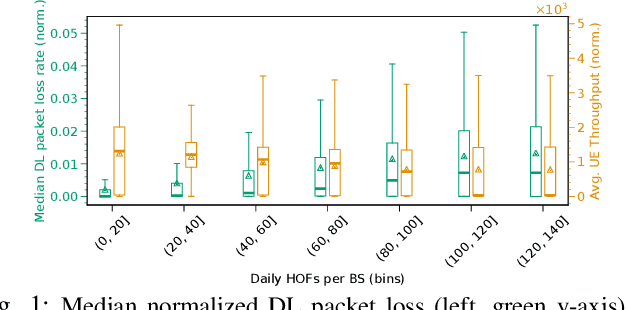
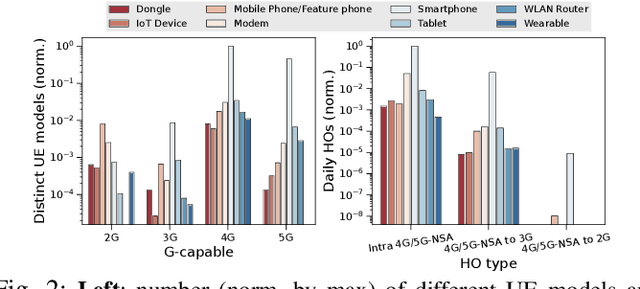
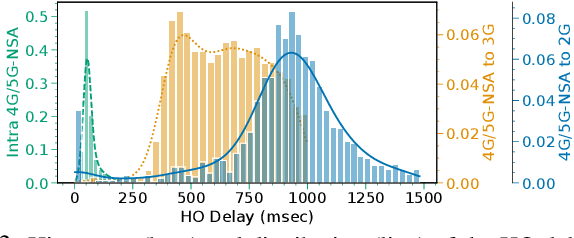
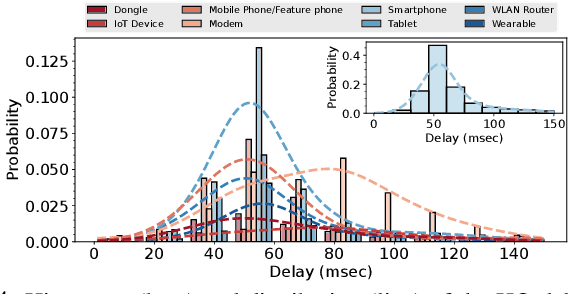
Abstract:With users demanding seamless connectivity, handovers (HOs) have become a fundamental element of cellular networks. However, optimizing HOs is a challenging problem, further exacerbated by the growing complexity of mobile networks. This paper presents the first countrywide study of HO optimization, through the prism of Smoothed Online Learning (SOL). We first analyze an extensive dataset from a commercial mobile network operator (MNO) in Europe with more than 40M users, to understand and reveal important features and performance impacts on HOs. Our findings highlight a correlation between HO failures/delays, and the characteristics of radio cells and end-user devices, showcasing the impact of heterogeneity in mobile networks nowadays. We subsequently model UE-cell associations as dynamic decisions and propose a realistic system model for smooth and accurate HOs that extends existing approaches by (i) incorporating device and cell features on HO optimization, and (ii) eliminating (prior) strong assumptions about requiring future signal measurements and knowledge of end-user mobility. Our algorithm, aligned with the O-RAN paradigm, provides robust dynamic regret guarantees, even in challenging environments, and shows superior performance in multiple scenarios with real-world and synthetic data.
Adaptive Resource Allocation for Virtualized Base Stations in O-RAN with Online Learning
Sep 04, 2023Abstract:Open Radio Access Network systems, with their virtualized base stations (vBSs), offer operators the benefits of increased flexibility, reduced costs, vendor diversity, and interoperability. Optimizing the allocation of resources in a vBS is challenging since it requires knowledge of the environment, (i.e., "external'' information), such as traffic demands and channel quality, which is difficult to acquire precisely over short intervals of a few seconds. To tackle this problem, we propose an online learning algorithm that balances the effective throughput and vBS energy consumption, even under unforeseeable and "challenging'' environments; for instance, non-stationary or adversarial traffic demands. We also develop a meta-learning scheme, which leverages the power of other algorithmic approaches, tailored for more "easy'' environments, and dynamically chooses the best performing one, thus enhancing the overall system's versatility and effectiveness. We prove the proposed solutions achieve sub-linear regret, providing zero average optimality gap even in challenging environments. The performance of the algorithms is evaluated with real-world data and various trace-driven evaluations, indicating savings of up to 64.5% in the power consumption of a vBS compared with state-of-the-art benchmarks.
Energy-aware Scheduling of Virtualized Base Stations in O-RAN with Online Learning
Aug 23, 2022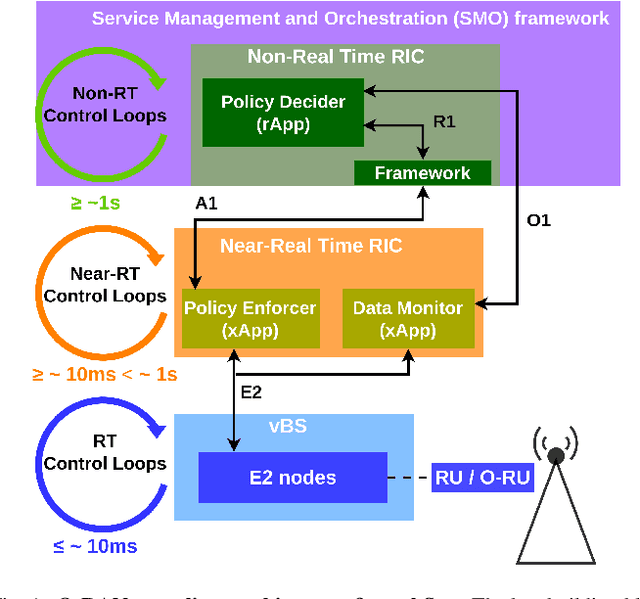
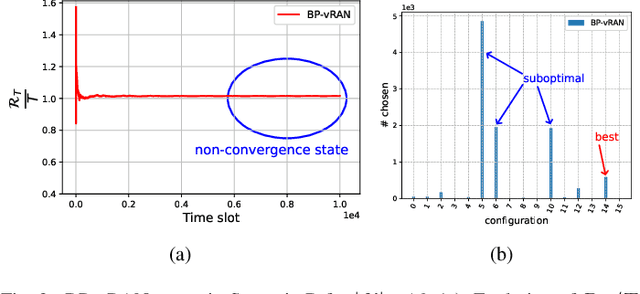
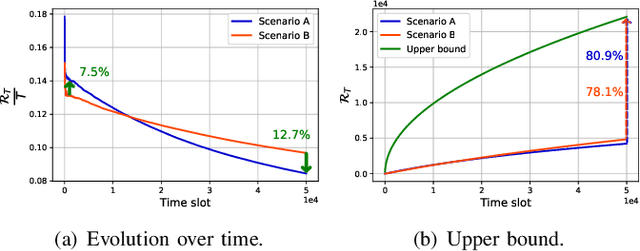
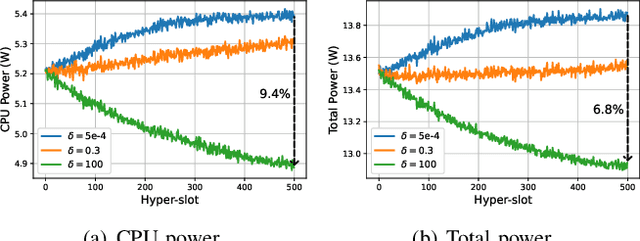
Abstract:The design of Open Radio Access Network (O-RAN) compliant systems for configuring the virtualized Base Stations (vBSs) is of paramount importance for network operators. This task is challenging since optimizing the vBS scheduling procedure requires knowledge of parameters, which are erratic and demanding to obtain in advance. In this paper, we propose an online learning algorithm for balancing the performance and energy consumption of a vBS. This algorithm provides performance guarantees under unforeseeable conditions, such as non-stationary traffic and network state, and is oblivious to the vBS operation profile. We study the problem in its most general form and we prove that the proposed technique achieves sub-linear regret (i.e., zero average optimality gap) even in a fast-changing environment. By using real-world data and various trace-driven evaluations, our findings indicate savings of up to 74.3% in the power consumption of a vBS in comparison with state-of-the-art benchmarks.
 Add to Chrome
Add to Chrome Add to Firefox
Add to Firefox Add to Edge
Add to Edge